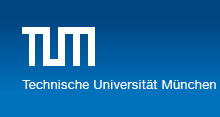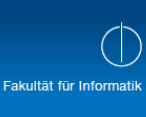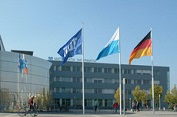Practical Course: Algorithms for Programming Contests
- Lecturer
Prof. Dr. Susanne Albers
- Teaching Assistant
Moritz Fuchs
Philipp Hoffmann
Christian Müller
Chris Pinkau
Stefan Toman
Please use the following e-mail address: conpra@in.tum.de.
- Module
IN0012,
IN2106,
TUMonline
- Preliminary Discussion
The preliminary discussion will take place on Thursday, January 21 at 1:00 p.m. in room MI 03.13.010.
- Time and Place
Wednesday, 2:00 - 4:00 p.m., Room MI 00.13.009A.
- Computer Room
The problems may be solved using our computer room MI 03.09.034, the "Rechnerhalle" or your own computer.
- Area
Computer Science III (Theoretical Computer Science)
- Prerequisites
Basics of programming in C, C++ or Java, for instance from the lecture Introduction to Informatics 1
Lecture Fundamentals of Algorithms and Data Structures
- Grading
To pass the practical course you need to solve enough of the exercise problems on your own and pass an oral examination in the end of the semester. The mark is computed using the quality and number of problems solved as well as the oral examination.
Problem Sets
Description
Programming contests are competitions for solving problems with the help of computer programs. By taking part in these contests one may improve skills in using algorithms and data structures as well as in problem solving, software development and teamwork through fun and games. Important topics in computer science are combined with the fun in programming.
There are plenty of programming contests by now, each of them having a different mode and focus. The exercise problems in this course will be similar to the ones used in the International Collegiate Programming Contest (ICPC), an international programming contest for students which is run by the Association for Computing Machinery (ACM) since the 1970s. In this contest, groups of up to three students each need to solve eight to ten problems in five hours using one computer only. The Computer Science Department of TUM has been participating in the ICPC with multiple teams for several years. A sample problem of our practical course gives an impression of the problems we are going to solve in this course.
There will be a lecture where we explain algorithms for a new topic each week. During the following week, the participants need to solve problems related to this topic. Solutions, different ideas and remarks regarding the problems will be presented in the next lecture. The problems differ in the level of difficulty: There will be problems asking for straightforward implementations of the presented algorithms as well as harder problems. For submitting and judging the submissions we will use TUMjudge, a fork of a system which is used for many rounds of the ICPC.
Goals of this course are
- a deep understanding of fundamental algorithms and data structures,
- getting to know specialized algorithms used in current research,
- improved skills in problem solving and problem analysis,
- practice in recognizing needed algorithms for given problems on one's own,
- improved capacities in teamwork by taking part in team contests,
- the application of important mathematical techniques as well as
- preparing the participants for programming contests.
Juli 2022: Jens Quedenfeld hat seine Promotion abgeschlossen.
Juni 2022: Maximilian Janke hat seine Promotion abgeschlossen.
March 2022: Alexander Eckl hat seine Promotion abgeschlossen.
Juni 2021: Leon Ladewig hat seine Promotion abgeschlossen.
Februar 2020: Susanne Albers ist Vorsitzende des Programmkomitees der SWAT 2020.
Februar 2020: Susanne Albers ist eingeladene Sprecherin auf dem ACM India Annual Event.
ESA/ALGO 2019 wird von Susanne Albers und ihrer Gruppe organisiert.
Juli 2019: Susanne Albers ist Festrednerin der Tagung SIROCCO 2019, Italien.
Mai 2019: Susanne Albers ist Festrednerin des Symposiums 50 Years Informatics
Dezember 2017: Susanne Albers hält Festvortrag am
Tag der Informatik, Absolventenfest der RWTH Aachen.
April 2017: Neues DFG Graduiertenkolleg AdONE.
Susanne Albers erhaelt ERC Advanced Grant. Pressemitteilung Bayerisches Staatsministerium f. Bildung u. Kultus, Wissenschaft u. Kunst.
August 2016: Susanne Albers hält einen Plenarvortrag auf Euro-Par 2016, Grenoble.
Susanne Albers, Nicole Megow und Andreas S. Schulz organisieren MAPSP 2017.
Juni 2016: Susanne Albers hält einen eingeladenen Vortrag in der Akademie der
Wissenschaften und der Literatur, Mainz.
September 2015: Susanne Albers ist eingeladene Sprecherin auf dem
MPI-INF – 25th Anniversary. Vortragende im
Programm sind mehrere Turing-Preisträger,
Leibniz-Preisträger, Humboldt-Preisträger und Gewinner von ERC Grants.
Juni 2015: Susanne Albers hält einen Plenarvortrag auf dem 31st International Symposium on Computational Geometry (SOCG15), Eindhoven.
Juni 2015: Susanne Albers ist eingeladene Sprecherin des Tutorials
Network Creation Games: How Does the Internet Form?,
organisiert von Erik D. Demaine (MIT) und MohammadTaghi Hajiaghayi (University of Maryland).
16th Conference on Electronic Commerce (EC15), Portland, Oregon.




